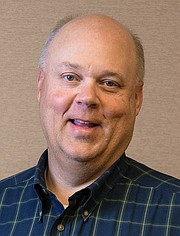SHATTERED SILENCE
By DEVIN WEEKS
Staff Writer
It’s been more than a year and a half since Coeur d’Alene High School Principal Troy Schueller took his life.
It’s a hurt that will never heal for his friends, family and the many students who knew and loved him.
His widow and longtime love, Saprina Schueller, has spoken out with a powerful written piece that shatters the silence surrounding what led to his death.
“We don’t want other families to go through what we’ve gone through. It’s such a devastating experience,” Saprina said Tuesday. “He’s the best person I’ve ever known, and I still think so much of him.”
At a counselor’s suggestion, Saprina put her thoughts to paper following the heartache she suffered when Troy’s birthday and their anniversary came around at the end of July.
“It had been well over a year,” she said, “and it felt like, going through the grieving process, things weren’t getting much better.”
She poured her heart into a narrative that chronicles the events that eventually became too much for Troy — chronic pain, possible chronic traumatic encephalopathy brought on by head injuries, subsequent secret opioid use, a problem at work, a sense of hopelessness he hid from the world.
She shared an excerpt from the note left behind: “Troy’s exact words were, ‘Ever since January 22, 2001, I have not been 'right.' My body aches continuously, but my headache never goes away. That, along with this alleged complaint, leaves me only one way out.’”
Saprina, who has been and still is extremely protective of her husband and their family, wasn’t expecting to share what she wrote. She later realized what she had created could help others.
She sent a text message to close friends and family members asking them to “pay it forward” and pass the story along to at least five people.
Soon after she posted her writing on the website she created, troysstory.com, it garnered 60,000 page views by people in all 50 states. As of Tuesday afternoon, that count had reached nearly 81,000.
“It’s become much bigger than we thought or expected,” Saprina said.
Saprina is normally a private person, but in sharing this incredibly personal story, she hopes to bring attention to four issues plaguing the country and North Idaho — brain trauma and CTE, opioid addiction, support for mental health, and privacy laws in the workplace.
Among those who received the initial message was family friend Rick Rasmussen, whose brother worked with Troy and whose daughter played volleyball with his daughter. Rasmussen was moved by Saprina’s courage in speaking out. As the CEO of Northwest Specialty Hospital and a lifelong North Idaho resident, Rasmussen is affected by and invested in seeing suicide trends improve. Idaho lost 350 people to suicide in 2016, according to the Idaho Department of Health and Welfare, and the state continually ranks in the top 10 for suicide.
“I went to five funerals in 18 months for people who committed suicide in our community, people who I knew,” Rasmussen said. “I go and it’s so hard to fathom that with people as friendly and as welcoming that we have in our community, still people feel they can’t reach out. They feel they’re alone. Our community isn’t that way. We’re not a big huge city that’s cold and uncompassionate. We look out for one another.
“I would have done anything possible for Troy. I’m in this health care industry. I could have found people to help him.”
Saprina continues to encourage the story to be shared.
“Our goal in sharing this story is to start real discussions about these social issues, remove the secrecy and shame, and start working together towards positive changes in our society,” she wrote. “Please pass Troy’s story on to at least five people to read through your Facebook page or any social media. We want Troy’s story to reach not just the community of Coeur d’Alene or the state of Idaho but the entire nation as these are issues that impact so many people. It is time to start a movement to pass laws, start research, and find funding to address these social issues.”



